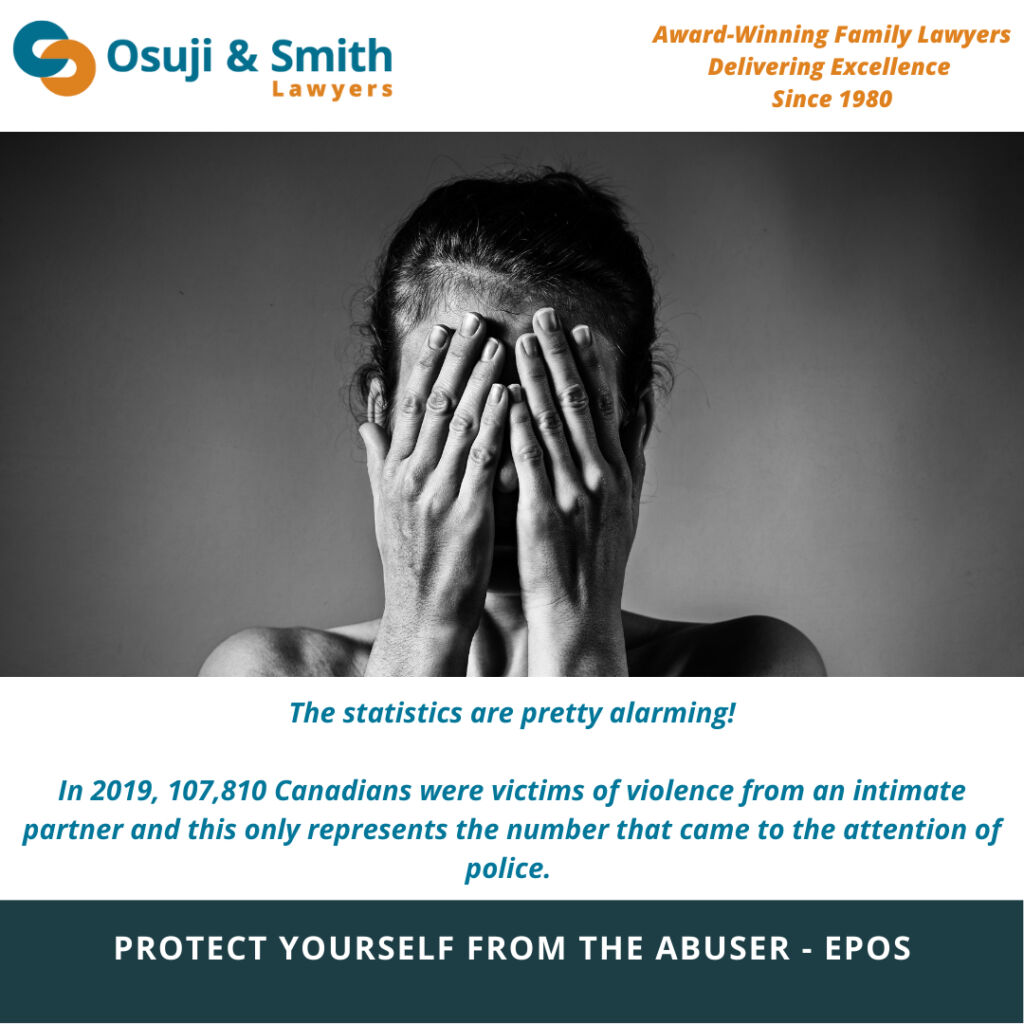Protect yourself from the Abuser – EPOs
CALGARY FAMILY LAW LAWYERS Can Help
The statistics are pretty alarming! In 2019, 107,810 Canadians were victims of violence from an intimate partner and this only represents the number that came to the attention of police.

Despite the above numbers, family law lawyers, peace officers, and social workers see a typical and unfortunate scenario play out countless times! A battered woman is afraid for her safety or the safety of her child. (Note it could be a man, but we will use a woman because it is more prevalent, as 79% of victims of domestic violence are women). When a woman is physically abused, the law permits her to obtain a court-issued Emergency Protection Order (EPO), against her abuser and when she is encouraged to make this application or have one made on her behalf, more often than not, the victim refuses to do so, for a variety of reasons mainly because she does not want the abuser to get into trouble or go to jail. Is this a valid apprehension?
What Is An EPO?
An EPO is a provision by the Protection Against Family Violence Act and it provides considerable protection. EPO is not an arrest warrant. This order can be issued if a person is a family member and has committed violence against another family member or a family member has reason to believe that a member of the family causing harm will continue or resume carrying out the family violence. The situation has to be serious or urgent such that you need a court order right away to protect you and your family.
Who is considered a family member?
A spouse, current or former, an adult interdependent partner, current or former; someone you live with or in an intimate relationship; someone you are related to by blood; your children, either biological, adopted, or other children in your care or someone you live with where one person has care and custody over the other person as a result of a court order (such as a guardianship order or trusteeship order).
A person cannot get an EPO against someone they are dating unless they live together in an intimate relationship or have children together, neither can they get an EPO against a roommate if the relationship is platonic. An EPO cannot be used against a parent who is using reasonable force to discipline their child. An application like that will be a misuse of the order and a waste of the court’s time.
What does an EPO achieve?
The order can be used to remove an offender from the home and prevent their return on an interim basis. The order can state that the person causing or threatening violence cannot contact the person experiencing the abuse by any means or go to the places the victim regularly goes like school, workplace, etc. The EPO can also state that only the person experiencing the abuse could occupy a residence if they lived together even though the victim’s name is not on the lease or title. An EPO can also give the police authority to physically remove the family member from the home and seize and store any weapons used to commit or threaten violence against the victim.
What happens if an EPO order is breached?
Usually, a copy of the EPO is served to the abuser by the police or a court process server and once it is served on them, the abuser has to comply with the order. If the person does not comply the victim can contact the police. The abuser can be arrested and summoned to appear before a Provincial Court. If found that they did breach the Order, they can be fined or jailed. Note that it is only if the order is breached that an arrest will be made. The issuance of an EPO does not automatically lead to arrest or jail time against the individual it is issued against.
Last word…take advantage of the help
If you or someone you know is facing domestic violence or the threat of domestic violence, be aware that an EPO can be obtained at any time, day or night and it can be used to provide considerable protection against the abuser. The order once issued is valid for 9 days following which the Court of Queen’s Bench will review the order and determine whether to revoke the order or keep it in place. Rest assured that the court will likely consider all the facts and make a determination that takes into account what is in the best interest of the victim, of the victim’s children if children are involved, and all other vital considerations. You or they do not need to suffer in silence. The time to act is now.
For more information or questions regarding EPOs and Queens Bench Protection Orders, contact a Victim Services Unit where you live, RCMP station, or contact your family lawyer if you have one or you can contact us at Osuji & Smith Calgary Family Lawyers. We are here to help.
Author: Juliette Omonigho

